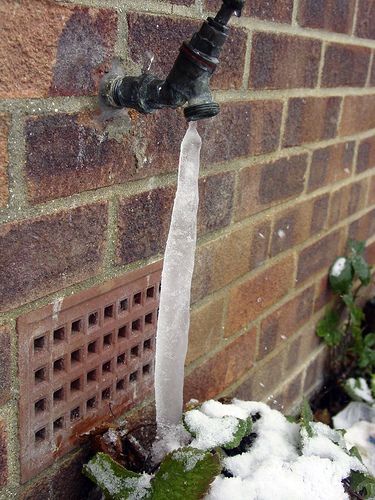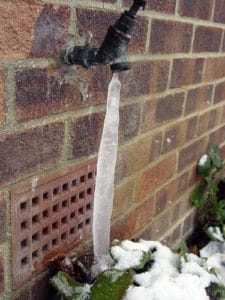 What to do about Frozen Pipes.
What to do about Frozen Pipes.
It’s cold outside, but you already knew that. One of the many winter woes for Indiana Homeowners is the problem of pipes filled with solidified water; a.k.a. frozen pipes! Though a seemingly mild plumbing problem, frozen pipes can cause great damage to the house. the problem of frozen pipes happens to be a common scenario during the winter months. It is not unlikely that you would hear or come across insurance companies dealing with “burst pipes situations”, every other day.
As you are no doubt aware, during the Indiana winters the water in your pipes can freeze. And when water freezes, it expands. This phenomenon causes the pipes to expand, and sometimes to such an extent that the pipes burst. Now some people may take this as a small concern, but trust us, it’s not. A single burst pipe, can put the whole house in jeopardy causing major damage and a serious repair bill.
How to Keep Pipes from Freezing Outdoors
To prevent outdoor pipes from freezing, get a thermal blanket or towels, which you will need be needing for each water supply line around the house. You have to cut the blanket or towels so that they are twice the length of each pipe. Before wrapping the blankets around the pipes, it is advisable that you soak them in hot water. Ensure that you wrap in two layers thick and with a snug fit. You can use Pipe Wrap Tape or duct tape to secure the blanket/towels in place.
To prevent pipes in the garage from freezing keep the doors closed.
Another simple method is to leave the water dripping in the sinks overnight or during the day. Running water, even at a slow rate, as that of a trickle, can prevent the pipes from freezing. This is because the temperature of the running water is above freezing.
Tip: Don’t waste the water run down the drain. Collect the water in some bucket, pan or container so that you can us it later (Pasta Anyone?).
Also, leave the doors of the kitchen cabinet open. This allows warmer air to circulate around the plumbing and reduce the chances of freezing.
Adding insulation to places such as attics, basements, etc, will help maintain higher temperatures keeping the pipes from potentially freezing.
If it is too late to prevent the problem, and your pipes have indeed frozen, then you need to be ready to thaw the pipes – especially on an extremely cold morning. Bring a bottle of water to boil and gently pour it on the frozen pipe. Turn on the faucet and if you notice a trickle, then give some more time for the pipe to thaw itself. Apart from this, you can use an electric hair dryer, a space heater (portable), etc. You may hear some banging, or scraping sounds within the walls of your home as the ices begins to that and the lines begin to clear.
Warning: Do not use any open flame device, as it risks the safety of the house.
Waking up to frozen pipes is never fun. If you do have a frozen pipe, and the above steps do not help solve the problem, give us a call right away for help.

 What to do about Frozen Pipes.
What to do about Frozen Pipes.


